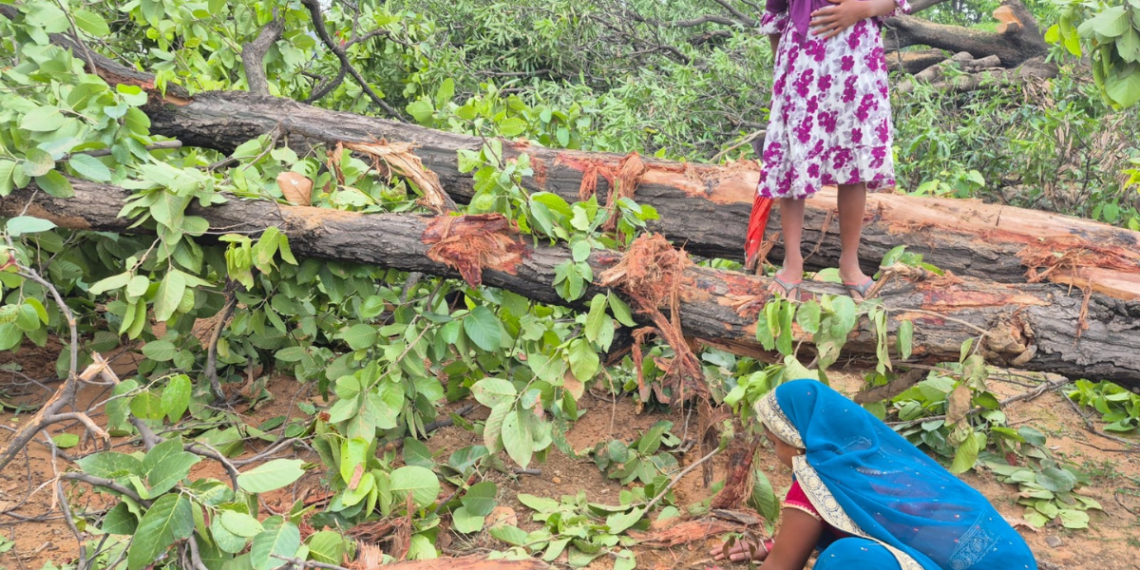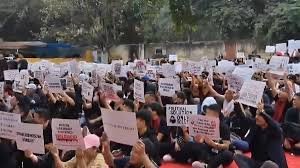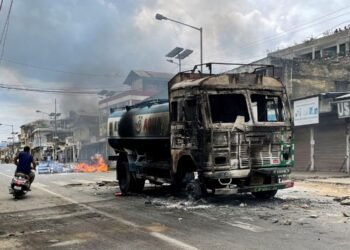This is the second part of our five-part investigative series, “The Mega Tribal Land Grab,” exposing the systemic erosion of Adivasi land rights in India. In this report, we turn to Chhattisgarh, where massive tree felling and mining clearances—allegedly obtained through forged Gram Sabha records—have triggered widespread tribal protests. As the Adani Group expands its coal operations across sacred forests and elephant corridors, communities fight back against dispossession, deception, and ecological destruction.
By Navin Upadhyay
July 12, 2025: Massive Forest clearance operations in tribal villages of Chhattisgarh over the past few weeks have triggered fresh outrage and civil resistance, as indigenous communities accuse the government and private corporations of grabbing their ancestral land using forged documents and coercion. The latest flashpoint occurred in Mudagaon village in Raigarh district, where over 200 acres of dense forest were cleared in late June 2025 to pave the way for the Gare Pelma II coal block, linked to Adani Enterprises under the Mine Developer and Operator (MDO) model. .The mine has been allotted to the Maharashtra State Power Generation Company Limited (MAHAGENCO), which has given the `MDO’ (mine developer cum operator) contract to the Adani group.
Forest department officials reportedly entered the village in the dead of night on June 26, accompanied by more than 2,000 armed police personnel, and began cutting trees without informing the local Gram Sabha. Villagers were blocked from accessing the forests they have relied on for generations. “They came like thieves,” said Laxmi Bai, a resident of Mudagaon. “We were not told, we never gave consent, and yet our trees are gone.”
The protest was joined by Congress MLA Vidyawati Sidar and activist Rinchin, both of whom were briefly detained by the police. The operation has drawn condemnation from civil rights groups, who say this is the latest chapter in a broader pattern of land appropriation, environmental destruction, and suppression of tribal voices across central India.
READ: Myanmar Horror: Junta Bombs Monastery Shelter, Killing 28 in Sagaing
Senior Congress leader and former Chhattisgarh chief minister Bhupesh Baghel on July 3 visited Tamnar tehsil in Raigarh district and extended his support to local villagers who are opposing tree felling for a coal mine project.
Baghel, along with more than 20 MLAs and Congress workers, visited Tamnar and met the villagers who have been agitating against the tree felling, a party statement said. “A race is underway to hand over the state’s water, forest, land and mineral wealth to Adani. Tree felling started without the permission of the local Gram Sabha. The protesting tribals have been saying that they are being tortured. The state government wants to hand over the coal mines to Adani by suppressing the rights of the tribals,” Baghel alleged.
In the Tamnar region of Raigarh district, Chhattisgarh, Adani’s company is recklessly deforesting under police protection.
This is a direct assault on Adivasi livelihoods, the environment, and wildlife.
The mainstream media remains silent — but we will not!#SaveHasdeo pic.twitter.com/w5gW5tz3J4
— Tribal Army (@TribalArmy) July 3, 2025
After the formation of the BJP government (in December 2023), the state has started handing over coal mines under the pressure of the national leadership of the BJP, the former CM claimed, noting that earlier, indiscriminate cutting of forests for a coal mine was witnessed in Hasdeo Arand region. The Chhattisgarh Assembly had passed a resolution in July 2022 during the Congress rule that mining activities will not be carried out in Hasdeo area, and sent it to the Centre seeking cancellation of all coal mines in the region, he said.
But after the BJP came to power in the state, the cutting of trees has started from Hasdeo to Tamnar, he alleged.
Forgery in the Forest: The Hasdeo Arand Battle
The developments in Raigarh mirror long-standing allegations of fraud and coercion from the Hasdeo Arand forest region, one of central India’s last remaining contiguous forests. The region, spread over 170,000 hectares across Surguja and Surajpur districts, is home to thousands of Adivasis and forms part of an endangered elephant corridor.
Here, two coal blocks—Parsa and Parsa East-Kente Basan (PEKB)—are at the heart of the conflict. Though owned by Rajasthan Rajya Vidyut Utpadan Nigam Limited (RRVUNL), these mines are being developed and operated by Adani Mining, a subsidiary of the Adani Group, under the MDO model.
In a scathing report released on November 6, 2024, the Chhattisgarh State Scheduled Tribes Commission, a constitutional authority, concluded that the environmental clearance for the Parsa block was obtained using fraudulent documents, including forged Gram Sabha resolutions and manipulated attendance registers.
READ: Pema Khandu: The Quiet Warrior Standing Tall Against China
Key findings included: • Signatures of deceased villagers (such as one Dilbandhu, who died in June 2016) used in official records • Minutes of meetings tampered with after the Gram Sabhas were held, sometimes inside government rest houses instead of public assemblies • Attendance figures inflated significantly: o Salhi: 150 actual attendees → 450 recorded o Hariharpur: 95 → 195 o Ghatbarra: 132 → 482
“These documents are fake. We never discussed mining,” Muneshwar Singh Porte, a leader of the Hasdeo Aranya Bachao Sangharsh Samiti, has gone on record claiming. “They want to erase our forests—and us—by using lies.”
Timeline of Fraud and Resistance: 2016–2025
The developments in Raigarh mirror long-standing allegations of fraud and coercion from the Hasdeo Arand forest region, one of central India’s last remaining contiguous forests. The region, spread over 170,000 hectares across Surguja and Surajpur districts, is home to thousands of Adivasis and forms part of an endangered elephant corridor.
छत्तीसगढ़ के रायगढ़ ज़िले में आदानी संचालित कोल माइंस परियोजना के लिए हज़ारों पेड़ों की अंधाधुंध कटाई ने आदिवासियों का गुस्सा भड़का दिया है, देखिए छत्तीसगढ़ से आजतक संवाददाता की ये रिपोर्ट.#ReporterDiary | @sumi_rajappan pic.twitter.com/jnGbb6Dqpq
— AajTak (@aajtak) July 9, 2025
Here, two coal blocks—Parsa and Parsa East-Kente Basan (PEKB)—are at the heart of the conflict. Though owned by Rajasthan Rajya Vidyut Utpadan Nigam Limited (RRVUNL), these mines are being developed and operated by Adani Mining, a subsidiary of the Adani Group, under the MDO model.
In a scathing report released on 6 November 2024, the Chhattisgarh State Scheduled Tribes Commission, a constitutional authority, concluded that the environmental clearance for the Parsa block was obtained using fraudulent documents, including forged Gram Sabha resolutions and manipulated attendance registers.
Key findings included:
- Signatures of deceased villagers (such as one Dilbandhu, who died in June 2016) used in official records
- Minutes of meetings tampered with after the Gram Sabhas were held, sometimes inside government rest houses instead of public assemblies
- Attendance figures inflated significantly:
- Salhi: 150 actual attendees → 450 recorded
- Hariharpur: 95 → 195
- Ghatbarra: 132 → 482
“These documents are fake. We never discussed mining,” said Muneshwar Singh Porte, a leader of the Hasdeo Aranya Bachao Sangharsh Samiti. “They want to erase our forests—and us—by using lies.”
Timeline of Fraud and Resistance: 2016–2025
The controversy around Parsa coal block spans nearly a decade. According to investigative journalist Paranjoy Guha Thakurta, who has reported extensively on the issue, the trail of falsification began as early as 2016, with the misuse of Gram Sabha procedures:
- 22 April 2017: Ghatbarra village record claimed villagers had “no objection” to mining—this was later found to be fabricated.
- 2017–2018: Gram Sabha meetings held in Fatehpur, Hariharpur, and Salhi reportedly had key resolutions inserted after the meetings; attendance registers were falsified.
- 3 August 2021: Villagers filed formal complaints with the Scheduled Tribes Commission alleging forgery.
- 6 April 2022: Despite pending complaints, the MoEFCC and Chhattisgarh government approved tree felling for the project.
- November–December 2023: Following BJP’s electoral victory, hundreds of trees were cut down at the Parsa site even before the swearing-in of the new Chief Minister Vishnu Deo Sai on 13 December. Protest leaders were detained, and scuffles broke out between police and villagers.
- 30 May 2024: The Commission ordered the suspension of all mining activity.
- October 2024: Tree-felling resumed, violating the Commission’s orders.
- 6 November 2024: Commission formally recommended cancellation of the environmental clearance and called for fresh Gram Sabha meetings in Salhi, Hariharpur, and Fatehpur.
Yet, neither the central nor state governments have acted on the Commission’s recommendations. Mining preparations continue.
Was the Land Transfer Legal?
Under Indian law, any diversion of forest land for industry in Scheduled Areas must receive free, prior, and informed consent of Gram Sabhas, as mandated under: • Forest Rights Act (FRA), 2006 • Panchayats (Extension to Scheduled Areas) Act (PESA), 1996 • Forest Conservation Act, 1980 • Right to Fair Compensation and Transparency in Land Acquisition Act, 2013
The Scheduled Tribes Commission concluded that these were not followed in the Parsa project. The resolutions were fabricated, and no legitimate Gram Sabha approvals were obtained. Moreover, villagers were allegedly misled into signing affidavits and accepting cheque payments—without understanding the land acquisition process.
What’s at Stake? Forests, Livelihoods, and Rights
The Parsa coal block holds an estimated 184.26 million tonnes of coal. Mining here threatens thousands of sal, mahua, and tendu trees, which are central to tribal livelihood and culture. Over 2 lakh trees are expected to be felled. The ecological cost includes the fragmentation of elephant corridors and loss of biodiversity in one of India’s richest forest belts.
“Mahua is not just income. It’s tradition, medicine, and ritual,” said Sunita Netam, a local woman leading a sit-in. “Cutting these trees is like cutting our future.”
Despite a unanimous resolution by the Chhattisgarh Assembly in 2022 opposing mining in Hasdeo, both Parsa and PEKB operations continue.
Current Status and Demands
- Legal challenges are pending before the Supreme Court and National Green Tribunal • Commission’s recommendations to cancel clearances and prosecute officials have not been implemented • Villagers demand: o Immediate halt to tree-felling o An independent investigation into the forged documents o Restoration of forest rights o Accountability for officials and corporate beneficiaries involved
Sudha Bharadwaj, senior human rights lawyer, said: “The state has become a facilitator for corporate expansion. It is ignoring its constitutional duties and violating laws meant to protect Adivasis.”
A Decade of Protest and a Battle Far from Over
Hasdeo’s tribals have maintained peaceful sit-ins for over 400 consecutive days. In Raigarh, reforestation efforts have begun, with villagers pledging to replant every sapling cut without consent. The movement is no longer just about forests—it is a battle for legal dignity, ecological survival, and indigenous sovereignty.
“They talk of development, but it’s development built on broken laws and broken promises,” said a protester holding a placard in Hasdeo. “We are not anti-national. We are the original nation. And we will not leave.”
Their message, etched into the soil and sung across the forests, is now a rallying cry:
“No consent, no mining.”
🏞️ Tribal Protests and the Ground Reality
➤ Hasdeo Arand: A Decade of Resistance
The Hasdeo Arand forest spans over 170,000 hectares, home to thousands of tribals and rich biodiversity, including endangered elephant corridors. Two coal blocks here—Parsa and Parsa East-Kente Basan (PEKB)—are operated by Adani as Mine Developer and Operator (MDO) for the Rajasthan government.
Despite a unanimous resolution in 2022 by the Chhattisgarh Assembly opposing further mining in Hasdeo, tree-felling and preparatory work continue.
- Over 2 lakh trees are slated to be cut.
- Livelihoods dependent on minor forest produce like mahua and tendu are at risk.
- Sit-ins and marches have continued for years, led by women, youth, and elders.
➤ Raigarh’s Mudagaon: June 2025 Escalation
In June 2025, forest officials entered Mudagaon village (Raigarh district) with over 2,000 police to clear 200 acres for the Gare Pelma II coal block. Tree-cutting took place at night without Gram Sabha approval. Protesters were blocked from accessing their forests.
“The police and forest officials came like thieves in the night. We were not told. We never agreed,” said Laxmi Bai, a Mudagaon resident.
Activists Vidyawati Sidar (Congress MLA) and Rinchin were detained during peaceful protests, triggering outrage across civil society.
🧾 Legal and Environmental Violations
| Violation | Law/Policy Breached | Details |
| Forged Consent | FRA, PESA | Consent documents manipulated; villagers never discussed mining |
| No Proper Land Acquisition | Land Acquisition Act (2013) | 32 villagers in Ghatbarra reportedly signed affidavits unknowingly |
| Ecological Damage | Forest Conservation Act, Wildlife Protection Act | Elephant corridors, protected tree species under threat |
| Disruption of Tribal Livelihoods | FRA, Constitution’s Fifth Schedule | Displacement without consent, no rehabilitation |
📣 Tribal Contentions
- Fake Gram Sabha Records
Villagers allege records were doctored without real participation. - Cultural and Spiritual Loss
Forests are not just resources—they are sacred spaces, vital to tribal identity. - Environmental Irreversibility
Cutting ancient forests will permanently damage biodiversity and aggravate climate risks. - Undermining Democratic Rights
The state ignored peaceful resolutions and protests; instead, it deployed police to suppress A Fight for Forests, Rights, and Justice
The tribal protestors and Adivasi rights activists claim that the transfer of tribal forest land to Adani-linked projects in Chhattisgarh was not just legally questionable—it violated the spirit and letter of India’s protective laws for Adivasis. Despite formal findings of forgery and sustained community resistance, mining continues. At stake is more than coal or development—this is a battle for legal dignity, ecological survival, and indigenous sovereignty.
The central and state governments now face growing calls to act decisively—cancel forged consents, uphold tribal rights, and protect Hasdeo Arand before it’s too late.













